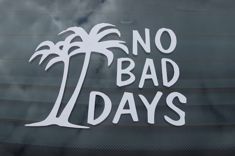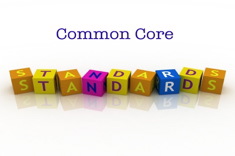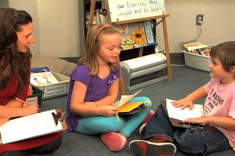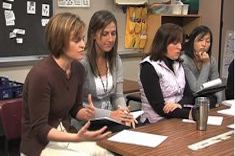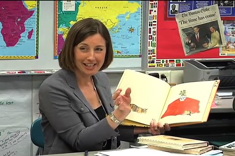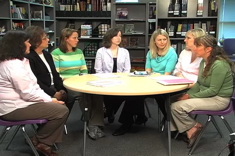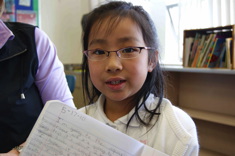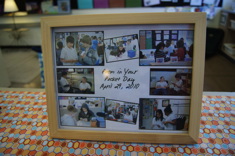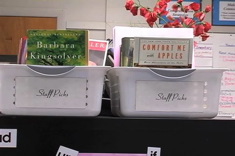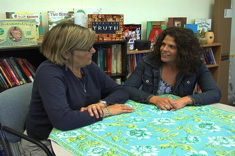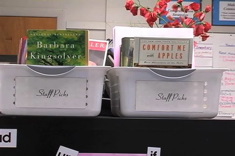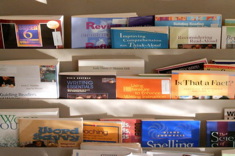Teacher Study Groups
Teacher study groups are as diverse as the teachers who participate in them. They can be an informal, low-key coffee klatch designed to relieve the daily stress of teaching. They can be highly structured inquiry groups, with detailed expectations for participants. Most study groups are likely somewhere between these two extremes, with colleagues getting together regularly to discuss books, view videos, and support each other as they test out new literacy instruction strategies in their classrooms. We include a few examples of study groups in the Choice Literacy library. If you regularly lead these groups, you'll want a membership that includes the Leaders Lounge. Here is where you will find advice from study group leaders who coordinate book groups, design workshop formats for groups, and develop structures for helping colleagues transfer the learning in study groups to the learning in their classrooms.
Latest Content
What’s the Most Beautiful Thing You Know About . . . ?
Ruth Shagoury and Melanie Quinn asked their colleagues to share the “most beautiful thing” about the puzzling student each of them is looking at closely in their study group. This is a great activity if you’re looking for a quick and easy icebreaker to spark some positive energy in your next study group or staff meeting and to remind everyone of the joys of our profession.
Remote Coaching Videos
We know our subscribers who are literacy coaches have a pressing need for resources to use in remote coaching contexts, as well as in college courses that are now being moved to online platforms. During the COVID-19 crisis, we are opening up more videos for our members to use in remote coaching.
Odd Habits
Mary Lee Hahn surveys Choice Literacy contributors about Odd Habits as they share truths and lies about their writing routines. This is a fun icebreaker for summer or fall orientation get-togethers.
Finding the “Ex” Factor in Explanatory Writing
Jeff Anderson launches a new series on explanatory writing, a topic of high interest to teachers now because of the Common Core.
Word Nerds
What words are worthy of study? Amanda Adrian and Heather Rader explore that question with colleagues.
Notes from the Mad Teachers Liberation Front: Create Your Manifesto
Start your school year off right (or get it back on track) with a manifesto about who you are and what you value. Ruth Shagoury provides a mentor poem, guidelines and samples.
Introducing the Common Core Standards in Writing (Part 2)
Heather Rader shares more guidelines for a professional development day on the Common Core with a writing focus.
Introducing the Writing Common Core Standards: Planning for Professional Development
Heather Rader sorts through goals, audience, and interest in planning a day of professional development linked to the writing standards in the Common Core.
Exit Slips Open Doors
Amanda Adrian explains how a simple professional development closure activity garnered many new invitations to classrooms.
Literacy Team Meeting: Focus on Word Work Part 2
In the second part of the literacy team meeting, teachers on the team move from the focus on sharing, to the important phase of where to go next as a team and as a school. Because the crucial work of the team is the work done between meetings, this is a critical discussion.
Professional Development Openers and Icebreakers (ROUND-UP)
This round-up includes suggestions for opening activities and icebreakers to energize your colleagues from Amanda Adrian, Aimee Buckner, Shari Frost, and Jennifer Jones.
Planning for a Demonstration Lesson Part 2
In this second installment of a two-part video series, Clare Landrigan takes a team of grades 3-5 teachers through the steps of selecting a book for a demonstration lesson.
What Can You Learn from Slice of Life Writing?
Ruth Ayres inspires us to develop the habit of writing on a regular basis by taking a bite out of the Slice of Life Story Challenge.
Second-Grade Team Meeting: Helping Students Choose Books Independently
In this five-minute excerpt from a second-grade team meeting, Principal Karen Szymusiak sits in on a discussion about the challenges of helping young readers learn to pick appropriate books independently.
The Superpower of Reflecting
Are you more of a Pollyanna or Eeyore reflector? Heather Rader takes you inside the questions that help us reflect even more deeply on our instructional practices.
What’s the Evidence?
Heather Rader shares her experiences working with a teacher team led by an outspoken leader. With listening and support, the team examines evidence in a new way.
Off the Dance Floor and Onto the Balcony: Getting the Big Picture in Schools
In the day-to-day triage of our schools and the sense of urgency that pushes us to always be accountable for every minute of the day, it is understandable that we tend to forget to pause to think about our larger goals. No one wants to “waste time.” This activity helps everyone keep the big picture in mind.
Poetry Fridays (and So Much More) for Students and Staff
 Mary Lee Hahn finds Poetry Fridays are about so much more than poetry, or even a pleasant end to the week. She shares how this activity is a wonderful way to bring together colleagues and students.
Sense of Little Engines
Heather Rader writes about "agency" – the challenge of letting students and teachers take charge of their learning. In concrete examples from a third-grade classroom and a professional development scoring session with teachers, Heather shares the subtleties of learning to trust, wait, and celebrate when learners of any age are responsible and independent.
Off the Beaten Professional Development Path: What I Learned from the Teachers as Writers Group
Teacher writing groups are a wonderful informal way for teachers to get together over the summer voluntarily. Heather Rader has format suggestions, as well as tips for helping your group run smoothly.
Virtual Book Clubs for Teachers
It’s virtually possible to get together around a book without getting together at all. Shari Frost shows us how.
Photovoice: Exploring Content Literacy with Images
As Suzy Kaback explores the question “How does your expertise function?” she explains the power of Photovoice and details its use in K-12 classrooms.
Tips for Conducting Demonstration Lessons, or How to Avoid the “Am I Doing This Right?” Question
Clare Landrigan and Tammy Mulligan have advice for teachers and literacy coaches leading demonstration lessons.
From Teacher to Coach: Building Community in the Early Days
The transition from teacher to coach is tricky. Melanie Quinn has advice for building relationships with colleagues in the first weeks of school.
“To Teach is to Learn Twice”: Creating Professional Communities in Schools
What are the hallmarks of professional learning communities that work well in schools?
Building the Reading Community Among Teachers
Jennifer Allen shares a few strategies for building the reading community beyond individual classrooms in your school. Book swaps, a shared staff novel, and family literacy breakfasts all reinforce the most important aspect of reading – it should be pleasurable and engrossing, no matter the age of the learner.
Still Revising After 10 Years: Sorting Through Pitfalls of Study Groups
Jennifer Allen considers how her study groups have changed over the past decade as she continues to balance district demands with teacher choice.
Relentless Consistency: Finding a Common Teaching Language Without Scripts
Sharing a common teaching vision begins with a common language, but not a script. Clare Landrigan and Tammy Mulligan share how teachers can work together to develop consistent ways of talking about literacy learning.
Great Little Books for Professional Book Clubs
What books are most likely to succeed in teacher study groups? Shari Frost shares her criteria for books teachers will embrace. . .and actually read with enthusiasm.
Assessing Professional Development: Focus on Feedback
Jennifer Allen details her professional development formats, and the crucial role feedback plays in their success.
Browse Content By
Type
Category
- Assessment Tools
- Big Fresh Archives
- Booklists
- Choice Numeracy
- Classroom Design
- Common Core
- Community Building
- Conferring
- Content Literacy
- Digital Literacy
- English Language Learners
- Equity
- Family Relations
- Free Samples
- Guiding Groups
- Leadership
- Literacy Coaches
- Mentor Texts
- Minilessons
- New Teacher Mentors
- Podcasts
- Poetry
- Quote Collections
- Reading Strategies
- Self Care
- Struggling and Striving Learners
- Talking and Listening
- Teacher Study Groups
- Teaching Reading
- Teaching Writing
- Word Study and Vocabulary
Author
- Melissa Quimby
- Nawal Qarooni
- Gwen Blumberg
- Julie Cox
- The Lead Learners
- Hannah Tills
- Josie Stewart
- Ruth Metcalfe
- Mallory Messenger
- Becca Burk
- Jodie Bailey
- Vivian Chen
- Mary Brower
- Tiffany Abbott Fuller
- Stephanie Affinito
- Ruth Ayres
- Leigh Anne Eck
- Heather Fisher
- Shari Frost
- Julie Johnson
- Suzy Kaback
- Gigi McAllister
- Shirl McPhillips
- Melanie Meehan
- Cathy Mere
- Debbie Miller
- Tara Barnett and Kate Mills
- Tammy Mulligan
- Dana Murphy
- Bitsy Parks
- David Pittman
- Brenda Power
- Heather Rader
- Matt Renwick
- Mandy Robek
- Christy Rush-Levine
- Gretchen Schroeder
- Jen Schwanke
- Brian Sepe
- Katherine Sokolowski
- Stella Villalba
- Jennifer Vincent
Grade Level
Choice Literacy Membership
Articles
Get full access to all Choice Literacy article content
Videos
Get full access to all Choice Literacy video content
Courses
Access Choice Literacy course curriculum and training






